Novelist Ames Sheldon is known for weaving rich wartime period detail, a love for women’s history, and extensive research into her books. Here, she reviews the 2012 British period series “The Bletchley Circle,” and fills us in on the real-life events that inspired the post-war London thriller.
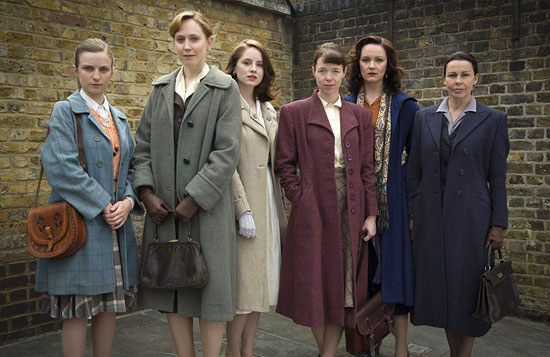
To help keep this site running: Willow and Thatch may receive a commission when you click on any of the links on our site and make a purchase after doing so.
Sheldon is author of Eleanor’s Wars, the story of Eleanor Sutton, the matriarch of a prosperous New Jersey family, who drove an ambulance during the Great War and now struggles to fight World War II on the home front, along with its sequel Don’t Put the Boats Away, the continuing family saga set in the aftermath of World War II.
![]()
On September 18, 1938, a group of British citizens moved into Bletchley Park, a 19th-century mansion in Buckinghamshire, England. They gathered under the guise of a shooting party, bringing along one of the best chefs from the Savoy Hotel, to help keep their cover.
They were really a secret team of scholars, academics, and Secret Intelligence Service members, all members of MI6 and the Government Code and Cypher School.
Tensions in Europe were rising: Hitler had just demanded that Sudentenland be taken from Czechoslovakia and annexed to Germany, and the team was there to gather and transmit intelligence on behalf of England.
One year later, Germany invaded Poland, and Great Britain and France declared war on Germany. The small operation grew quickly as ‘Men and women of a professor type’ – all sworn to the Official Secrets Act – were recruited to work at Bletchley Park to decipher the enemy’s military communications.
The period series The Bletchley Circle (2012 – 14) pays tribute to the women of the Government Code and Cypher School credited with shortening the war, but it’s also a nod to all the women whose wartime efforts changed society’s perception of the female sex.
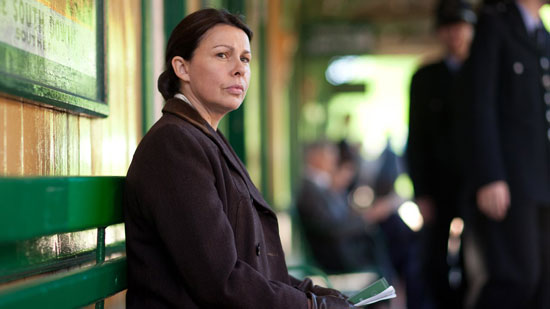
The historical drama opens in 1943 with a scene showing the four principal characters—Susan Gray, Millie Harcourt, Julia Graham, and Lucy—working together to decipher an encryption.
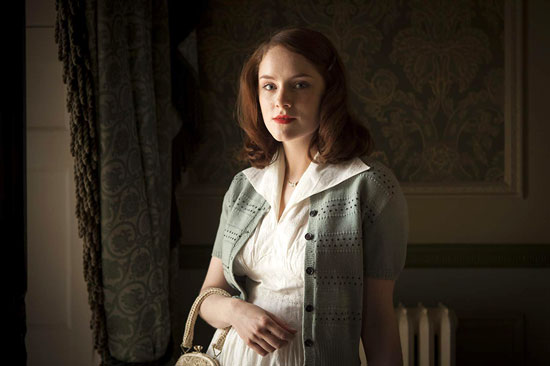
The message appears to concern personnel reassignments for a person named Dietrich, but Susan (Anna Maxwell Martin, Bleak House) starts to think the name is a code within the cipher. With help from Millie (Rachael Stirling, Churchill’s Secret) and Lucy (Sophie Rundle, Peaky Blinders), who has a photographic memory, the women realize it could be a code for battle orders.
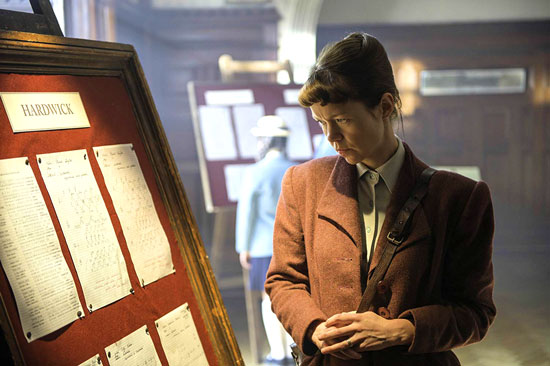
Thanks to these women, the British military know where the German army will be in three days time. Susan’s boss Jean McBrian (Julie Graham, Shetland) says, “This will make a difference… all those troops (will be) on the move because of us.” Susan reflects “when this (war) is over, we’ll have to go back to being ordinary girls.” Three-quarters Bletchley Park’s staff were women, (largely in uniform, the rest recruited through Civil Service), and like our protagonists, most were expected to return to quiet, domestic lives after the war.
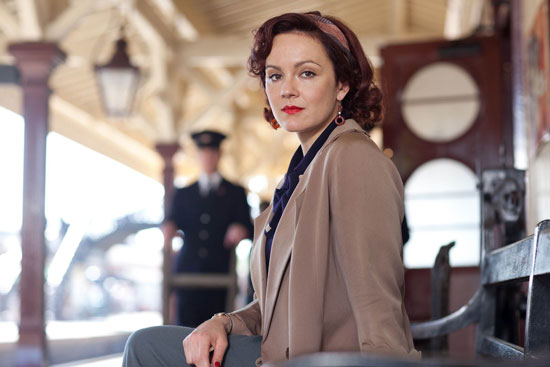
The period drama moves ahead nine years. In London, Susan, now a married housewife with two children, is following the news about a series of murders of young women. After studying a map and clippings about the crimes, she is convinced that she knows where another murder victim has been killed.
Bletchley Park was top secret (its documents remained classified until the mid-1970s), and the code-breakers had to conceal their work from their own family members. Susan’s husband knows that she has a head for solving puzzles, but nothing more, so she uses the ploy of starting a book club to discuss “Great Expectations” to assemble her former colleagues and try to recruit them to help her find the killer.
No-nonsense Jean says this isn’t our place – it’s up to the police. Susan argues passionately, “We could be useful again. We used to make a difference every day. We saved lives.” When another woman goes missing, they band together and work to decipher the murderer’s patterns, as they would code.
World War II feels quite recent in this series; the experiences these women and men had during the war are still shaping their lives in 1952, but it’s still very much a man’s world. Ration books are needed to buy food, and Susan works to make meat last the week. The husbands become increasingly suspicious about the women’s unexplained absences, but household management and keeping the peace at home are not enough to engage their impressive intellects.
It’s a pleasure to watch these smart women think, interact with, and support each other, especially as played against the skepticism which regularly met 1950s era capable women. Although a few of the scenes are grisly, ultimately the series is uplifting. As in other period dramas like “Land Girls,” “Home Fires,” and “Call the Midwife,” their camaraderie is inspiring, and the scenes are rich with historical accuracy, nuance, and classic British reserve.
“Bletchley Circle” is a standout from other period dramas, not just because the (utterly human, relatable) heroes are female, but because it gives us characters who refuse to be ordinary. And because of this, the period drama is anything but.
Seasons 1 & 2 of The Bletchley Circle are AVAILABLE to STREAM
Rated TV-14: contains adult subject matter and some scenes that may be disturbing to sensitive viewers.
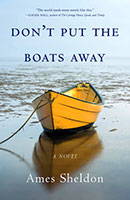 Ames Sheldon is the author of Don’t Put the Boats Away: In the aftermath of World War II, the members of the Sutton family are reeling from a huge loss. As they attempt to rebuild their lives, daughter Harriet becomes a chemist despite an inhospitable culture for career women in 1940s and ’50s, while Nat works as a musician in Minneapolis, but the intergenerational consequences of trauma—including divorce and alcoholism—emerge. Don’t Put the Boats Away is available here.
Ames Sheldon is the author of Don’t Put the Boats Away: In the aftermath of World War II, the members of the Sutton family are reeling from a huge loss. As they attempt to rebuild their lives, daughter Harriet becomes a chemist despite an inhospitable culture for career women in 1940s and ’50s, while Nat works as a musician in Minneapolis, but the intergenerational consequences of trauma—including divorce and alcoholism—emerge. Don’t Put the Boats Away is available here.
At the age of nine while reading Stuart Little, Sheldon realized she wanted to be a writer, so started writing stories. Many stories and poems later, she helped write and edit the ground-breaking Women’s History Sources: A Guide to Archives and Manuscript Collections in the United States (R.R. Bowker, 1979). In the process of working on this monumental reference book, Sheldon discovered her love for women’s history and using primary sources for research.
Sheldon is also the author of the historical fiction novel Eleanor’s Wars, which is the prequel to Don’t Put the Boats Away. Eleanor’s Wars won the 2016 Benjamin Franklin Gold Award for Best New Voice: Fiction. Eleanor’s Wars is available here.
If you enjoyed this post, be sure to see The Period Films List, with the best historical and costume dramas sorted by era. Also see our review of Restless and our review of The Hour./

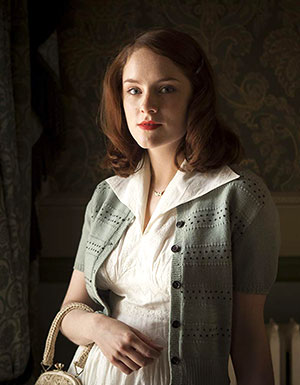

kathryn Carlson
May 14, 2024 at 8:57 am (2 years ago)I loved “The Bletchley Circle”. wonderful actors and drama.! I wish there were more like it on tv. The recent detective shows are usually too violent.